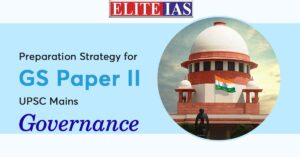UPSC Preparation Tips: Aspirants may find self-study for the Union Public Service Commission’s (UPSC) Civil Service Examination (CSE) to be a challenging task. While some applicants choose to study at various institutes and academies, others may choose to study independently.
UPSC is a difficult exam to pass, but with a dedicated study plan spaced out over a year, you can realise your dream of working for the government.
UPSC Preparation Tips : With a 365-day preparation period, it is natural for any applicant to struggle with how to focus on studies for UPSC exams. This article will provide you with simple and practical strategies for improving your concentration that you can easily include into your daily study routine. Your ability to concentrate has a significant impact on your achievement. It’s your ability to concentrate your mind solely on one issue while eradicating everything else that’s even vaguely unrelated. The UPSC Syllabus is extensive, and there is no other option than to study for lengthy periods of time every day with the same zeal. This necessitates a high level of concentration.
15 Magical UPSC Preparation Tips on How to Study for IAS
1. Focus on Self Discipline
- Make a conscious effort to keep your thoughts from wandering. I understand that it is easier said than done. But remember to remind yourself to come to a halt when your thoughts begin to fly.
- This may take some time to master, but if you put in the effort, you’ll see results within the first month.
- Writing down distracting thoughts on a piece of paper every time they enter your mind is a smart approach to keep them out of your mind.
2. Be 100% sure of the syllabus:
- The first thing that applicants should do is print out a copy of the syllabus. With that, aspirants can able to locate the recommended reading list and get started.
- Before beginning their preparation, aspirants should spend some time browsing over the curriculum to acquire a sense of what can be asked in the exam.
- You will save time and money in the future by comparing the syllabus and purchasing books accordingly.
- The necessity of employing minimal study resources and making the most of your time by going over the same topic several times.
3. Prepare feasible Study Plan!
- When designing your study schedule, keep the following points in mind: –
- When it comes to studying, determine whether you are a day or night person.
- Calculate practical study hours that fit into your everyday routine. Sequentially divide your subject and topics in decreasing order of priority. Give subjects that are more difficult to study longer days/hours.
- Set daily study goals and stay motivated to meet them. Time your studies in 40-minute increments.
- Make a quick review of everything you’ve learned so far every 40 minutes.
4. Select the Perfect Study Space!
- Your study environment has a significant impact on the efficacy of your efforts.
- The correct environment also allows you to focus on your studies for longer periods of time.
- The best place to study is one where you can concentrate the most.
- Choose a spot in the house that is quiet.
- Your study area should be equipped with a table and chair, as well as a nearby bookshelf where you may store your books and notes.
- Use your study area solely for studying.
5. Focus on Gaining Knowledge
- Remember that UPSC CSE is examining your understanding of the subject as well as your ability to apply what you have learned when studying and taking the exam.
- Spend no more time on any issue than is necessary. Always keep in mind that you’re preparing for the CSE, not to write a thesis on any subject.
- Keep in mind that you only have a few months to prepare for the exam, so make the most of your time.
6. Practice Active Learning
- Active learning is the process of honing your ability to apply what you’ve learnt.
- This can be accomplished in a variety of ways: –
- When information is applied to real-life situations,
- By distinguishing between your previous knowledge and the new knowledge you’ve acquired.
- Rephrasing and writing down what you’ve learned
- By making use of newly acquired knowledge whenever it is suitable and feasible.
7. Focus on reading a newspaper: UPSC Preparation Tips
- The Hindu is a must-read for aspirants. While reading the newspaper takes a long time at first, with consistent reading, the speed picks up.
- Your reading speed and comprehension power will improve over time, and you will spend no more than 30 minutes reading by the end of the preparation session.
- For current events, relying solely on newspapers is insufficient.
8. Stay Away from Social-Media and Mobile Phones
- When you’re attempting to concentrate, phones, tablets, television, radio, and other electronic devices are huge distractions.
- Exam preparation for the UPSC is not the best time to put your ability to concentrate to the test.
- The best thing to do is to stay away from the temptations.
- Turn off all of your electronic devices and store them safely away from your reach.
- Keep your laptop on for secondary research, but exercise restraint when it comes to hitting social network buttons.
9. Focus One Thing at a time!
- Trying to master numerous things at once is the worst error you can make when it comes to concentration.
- It is usually ideal to devote all of your attention to a single task at a time.
- You can enhance your productivity by focusing on one activity at a time.
- Ineffective learning occurs when there are too many tasks.
10. Recollecting and making connects:
- Because the majority of applicants will use the same reference materials and textbooks, it is critical that you bring something extra when composing your responses.
- The key to passing this exam is to review and reinforce what you’ve learned.
- The more you practise, the better you’ll be at answering the question. Because of your numerous changes, the solution to each question should come to mind quickly.
11. Enjoy Your Study Time
- If you are passionate about the subject you are learning, you will naturally focus on it.
- Subjects you despise, on the other hand, can be tiring and difficult to get through.
- If you want to pass the UPSC, tell yourself that you enjoy the subject.
- Treat it as something you want to do rather than something you have to do.
12. Bring in a holistic approach to your essay:
- UPSC is seeking for those who approach any subject holistically. As a result, make a list of the points you want to discuss before you begin writing your essay.
- Make certain that you cover all elements of the subject. The flow or connectors between paragraphs must be fluid, and the examiner should not notice any gaps.
- Aspirants should read the toppers’ essays from the previous year to have a good idea of how to structure their own essays.
13. Get Enough Sleep
- Great concentration requires a clear, rejuvenated, and peaceful mind.
- Rest is necessary for a mind to feel fresh and tranquil.
- Allow your brain to rest for eight hours every night.
- Turn off the lights, the phone, and any other sources of disturbance in the room so you can enjoy a decent night’s sleep.
14. Get Good Exercise
- In a healthy body, there is a healthy mind. Exercising causes your bloodstream to release a joyful hormone called “endorphin,” which helps decrease stress and makes you feel more calm.
- You must overcome worry and restlessness in order to concentrate on your studies.
Allow your daily dose of exercise to handle it.
15. Try Meditation
- Meditation, believe it or not, is a powerful tool for improving concentration.
- Meditation is essentially a controlled breathing activity that improves your body’s blood circulation.
- It helps your brain to function more quickly and smoothly.
- Start meditating for 10 minutes every day in a peaceful spot.
- You may combine your meditation and yoga minutes for even better effects.
- Surya Namaskar, Sarvangasana, and pranayam should all be included in your daily routine.
UPSC Preparation Tips: There is no global magic pill that can help you pass this test. Along the road, we’ve all made our fair share of errors. Be strategic in your planning and make sure your efforts are constant. This exam isn’t about being perfect; it’s about proving your commitment and honesty. Finally, remind yourself how strongly you want to crack the UPSC every time you feel like giving up. These tried-and-true strategies for concentrating in UPSC exams have shown to be effective. Best of luck!




